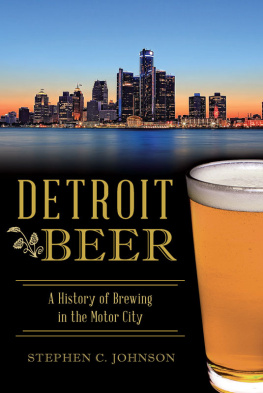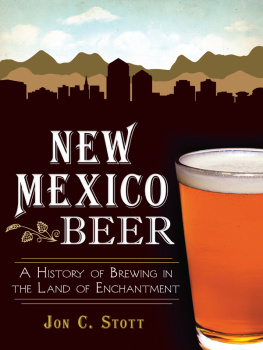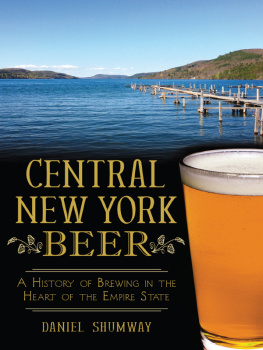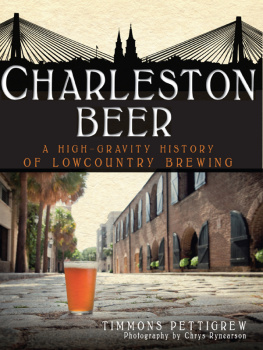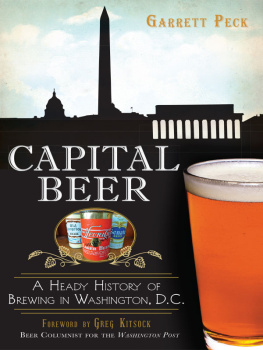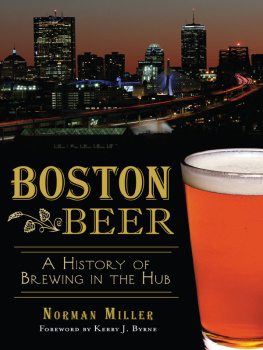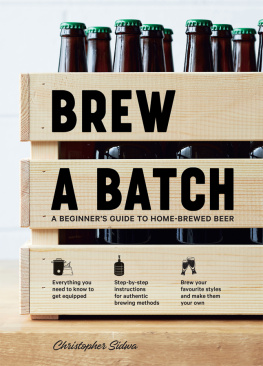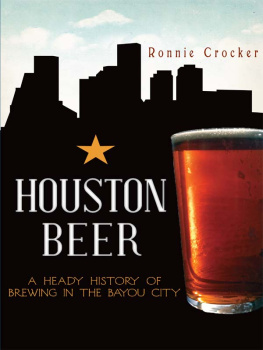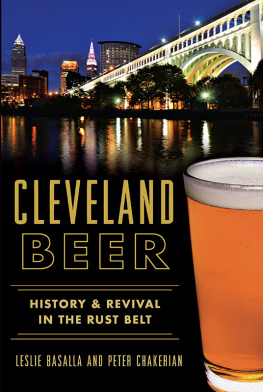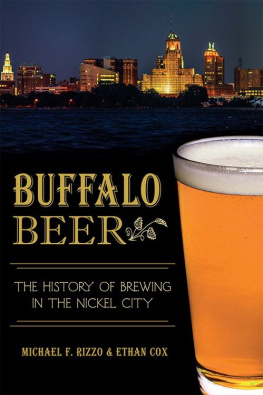


Published by American Palate
A Division of The History Press
Charleston, SC
www.historypress.net
Copyright 2016 by Stephen C. Johnson
All rights reserved
Front cover skyline photo courtesy of Ken Hipp, Flickr.
First published 2016
e-book edition 2016
ISBN 978.1.62585.733.0
Library of Congress Control Number: 2015960010
print edition ISBN 978.1.46711.972.6
Notice: The information in this book is true and complete to the best of our knowledge. It is offered without guarantee on the part of the author or The History Press. The author and The History Press disclaim all liability in connection with the use of this book.
All rights reserved. No part of this book may be reproduced or transmitted in any form whatsoever without prior written permission from the publisher except in the case of brief quotations embodied in critical articles and reviews.
CONTENTS
FOREWORD
My passion for craft beer started in the late 80s. I was living in Boston, where a local guy by the name of Jim Koch was making a tasty Boston lager and seemed to be doing pretty well with it. Of course, at the time we had no idea he would be one of the founding fathers of the craft beer revolutionwe just knew he was definitely on to something. I had always enjoyed beer, but now it seemed bigger to me somehow. I started to see how it brought people together. I started to feel how passionate people were about this simple liquid that could be shared and enjoyed by such a diverse sample of the population. I also realized I had the bug to brew.
As do many newbies in the chapters of history, I paid homage to my beer heroesby knocking them off. I began home brewing my own Boston lager and hand-capping bottles that my roommate and I could take to parties. It wasnt bad. It wasnt great. The most important thing was that I was brewing my own beer. Soon I was swept up into the passionate world of craft beer, and there was no turning back.
What I came to realize later is that passion for great beer has been around for a long, long, long time. Beer has helped shape culture and society literally and figuratively, and one city in particular that had felt the impact of this golden elixir was Detroit. With more than forty production breweries, Detroit was the beer capital of the country from the late 1800s until Prohibition. Even during Prohibition, the spirit of Detroit beer lovers was hard to keep down. In fact, the idea of not having our beloved suds was not even an option for somelike the Purple Gang, whose members were notorious bootleggers who brought over barrels of liquid gold right down at the end of the block of where our brewery is located (Atwater and the Detroit River).
Memories of touring the Strohs brewery and tasting freshly brewed beers in the taproom were part of the reason that I decided to relocate to Detroit in 1997. I knew that I wanted to be part of the renaissance of the city, and what better way to help bring back the city with such a long and storied past for brewing than infusing new life into it with a craft brewery.
I love lagers, so my vision is to create unique, delicious, refreshing German-style craft lagers. But another important part of my vision was to bring back the community side of beerthe idea of sitting down with friends at communal tables to enjoy great beer and great conversation. This is prevalent in Europe and especially Germany, but I believe its an important thread in the social, cultural and economic impact of the craft. Getting to know your neighbor by sitting at a table and having a cold one. Solving the worlds problems one pint at a time. Making friends and memories that will last a lifetime. Its a way of life that transcends generations, especially in Detroit, an intoxicating town that embraces creativity and diversity and welcomes anyone who brings that same energy.
Its far more than just a liquid. Beer has been, and still is, a magical elixir that lubricates many of the moving parts of society while at the same time bonding passionate people and communities together. Always has, always will. Were all just lucky enough to taste a small part of its history.
MARK RIETH
Owner of Atwater Brewery, Detroit
ACKNOWLEDGEMENTS
The phrase It takes a village is a great way to sum up the acknowledgements section of this book. Planning, researching, interviewing, writing, editing, arranging and taking pictures are big parts of a book project. Just as important, however, are the people who donated time and effort to help me with this project. First and foremost, I need to thank my wife, Laura Johnson, and my parents, George and Noreen Johnson. If it were not for their love, editing and support, I wouldnt have even considered tackling this project. I would also like to thank my friends for all of their support. Running a beer-related business and writing and researching a book at the same time means that I cannot always be there for everyday life events. I appreciate everyones understanding. Its your family and friends who stand by you through thick and thin. I would like to thank all of the brewers, brewery owners and their staff members who gave me their time and provided valuable input and background information. Without them, this book wouldnt be possible. Last but not least, I would like to thank the beer enthusiasts in the great state of Michigan. I love being a part of such an enthusiastic, nice and helpful group of fans!
PREFACE
Detroit has come a long way from its modest beginnings in 1701 when Antoine Cadillac founded it. Detroit went from being a small fur trading post for the French to becoming an industrial powerhouse with the auto industry. Like other parts of the country, Detroit attracted immigrants from Europe and the rest of the world as they sought new opportunities. With them, they brought their own local food tastes and beer customs that were soon reflected on menus and beverage listings at local restaurants, bars and saloons.
From the mid-1800s to present day, Detroit has always had a rich and vibrant beer scene that reflected its cultural diversity. Today, Detroit continues to offer an amazing array of beer styles, from German to Belgian to American classics. We live in a truly great time for beer. Detroit has nationally award-winning breweries and brewpubs, as well as amazing beer festivals that draw thousands of people to the area each year. Detroit also has beer and food pairing events that educate attendees on tasty food and beverage choices to maximize their dining experience. Furthermore, the Detroit area has beer bars that make national top ten lists for their variety and service, as well as the quality of their product. Lastly, there are also beer tours that expose people to the Detroit area, take them to breweries for samplings and help others discover all the great places to imbibe.
This book tells the story of Detroit beer from the beginning of the small-scale brewers to the rise and fall of large-scale brewing and back to the rebirth of the local breweries of today. It will chronicle this all from the viewpoint of a Detroit native and beer lover. I hope you enjoy reading this book as much I did writing it.
INTRODUCTION
Beer has always been part of our culture in the United States and the rest of the world. From hunters and gatherers making beer from grain and water to civilized societies developing new styles, beer has been there as the life of the party. Beer has always been used as a celebratory drink. People drink it at birthdays, anniversaries, weddings, sporting events, funerals and other types of special celebrations and occasions.
Next page
